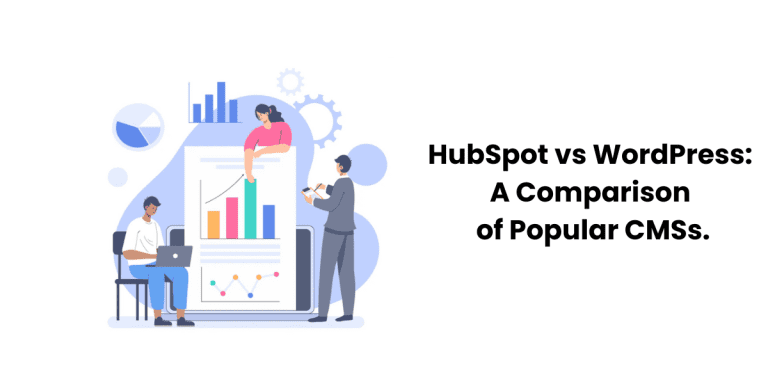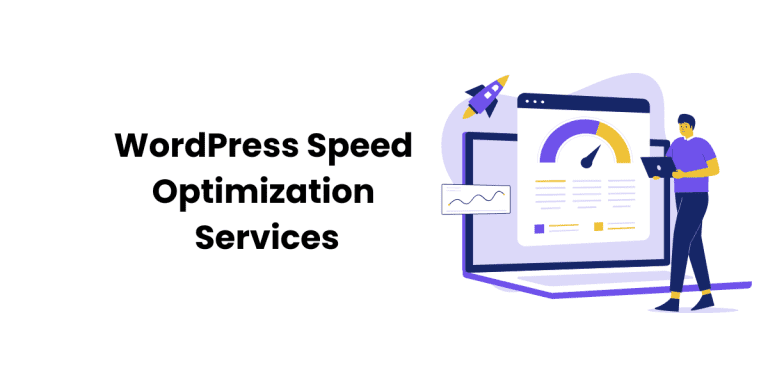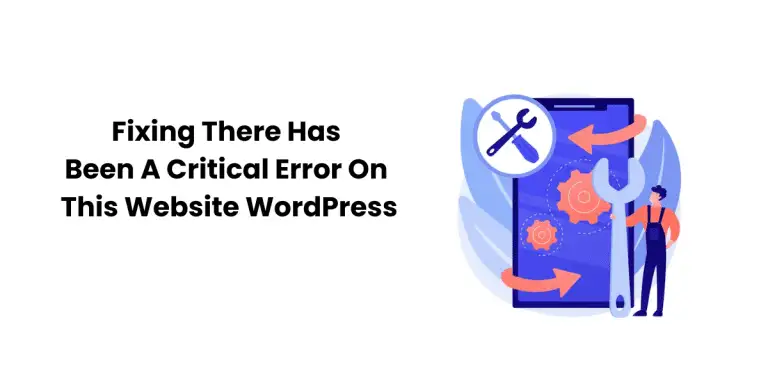Joomla SEO is the practice of optimizing a Joomla website to improve its ranking and visibility on search engines. It involves various techniques and expert strategies to make the website more search engine friendly and to increase its chances of appearing on the first page of search results. Here are some reasons why Joomla Search Engine Optimization is important:
What is Joomla SEO and why is it important?
Joomla SEO is the practice of optimizing a Joomla website to improve its ranking and visibility on search engines.
It is important because it helps to increase the website’s visibility and attract more organic traffic from search engines.
By optimizing the website for search engines, it becomes easier for users to find the website when searching for relevant keywords or phrases.
It can also help to improve the user experience of the website by making it more user-friendly and easy to navigate.
The benefits of optimizing your Joomla website for search engines
Improved visibility and increased organic traffic from search engines.
Better user experience and increased user engagement.
Higher conversion rates and increased revenue.
Competitive advantage over other websites that are not optimized for search engines.
Cost-effective marketing strategy compared to other forms of online advertising.
To optimize a Joomla website for search engines, there are various best practices that can be followed, such as updating the Joomla version and extensions regularly, conducting keyword research, enabling search-friendly URLs, writing a great meta title and description, and using SEO plugins.
Keyword Research
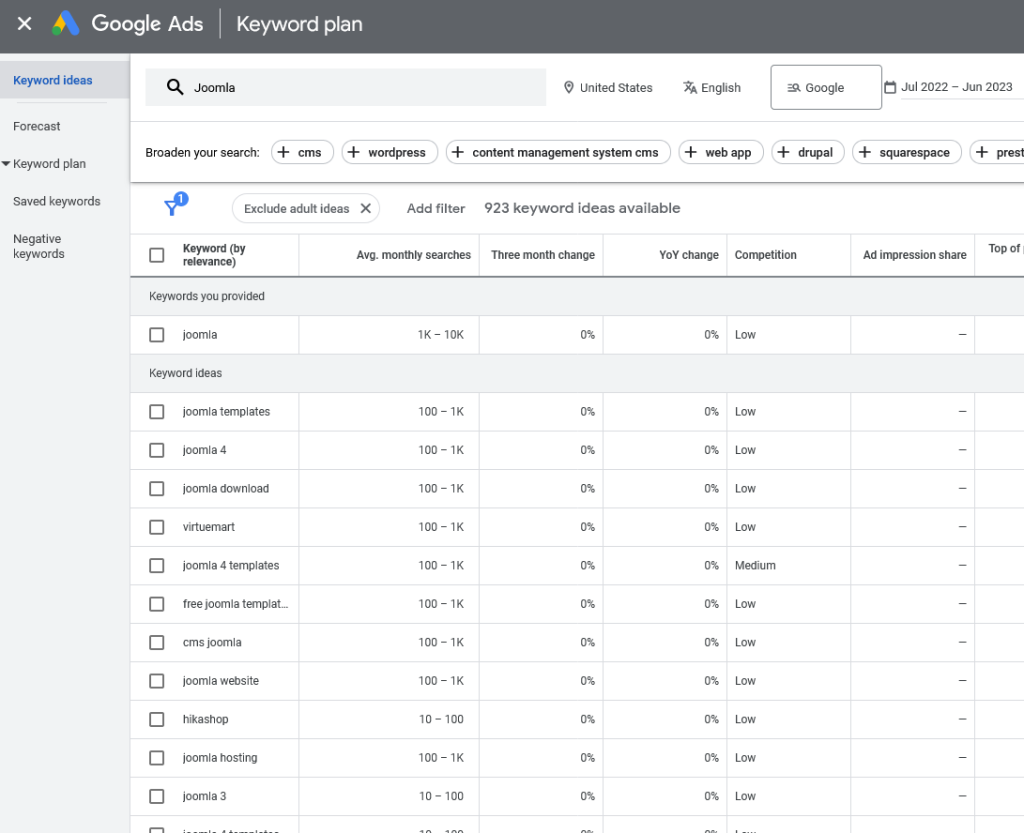
Understanding the importance of keyword research
Keyword research is an essential part of Joomla Search Engine Optimization as it helps to identify the most relevant and high-value keywords for the website.
By conducting keyword research, website owners can understand what their target audience is searching for and optimize their content accordingly.
Keyword research also helps to identify the level of competition for specific keywords and allows website owners to choose less competitive keywords to target.
Tools and techniques for effective keyword research
In the following image you can see the keyword overview for the Keyword “Joomla”. The search volume from US is about 6.6K and the keyword difficultly is 82% which is very high. So we shouldn’t consider such keywords which has high Keyword Difficultly. Its always a good idea to choose keywords with low keyword difficulty and and high volume.
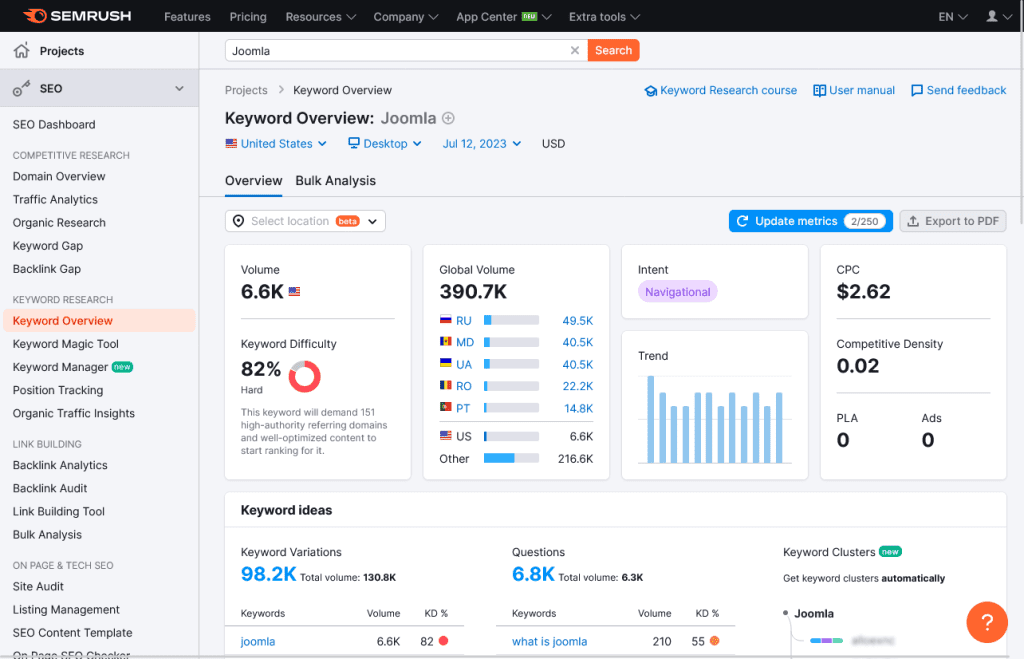
There are various tools and techniques that can be used for effective keyword research, such as Google Keyword Planner, SEMrush, Ahrefs, Moz, and Keyword Tool.
These tools can help to identify relevant keywords, analyze their search volume and competition, and provide suggestions for related keywords.
Other techniques for effective keyword research include analyzing competitor websites, using Google Autocomplete, and conducting surveys or interviews with target audiences.
Identifying high-value keywords for your Joomla website
To identify high-value keywords for a Joomla website, website owners should consider the relevance, search volume, and competition level of the keywords for their target audience.
Website owners should also consider the intent behind the keywords and ensure that their content aligns with the user’s search intent.
It is also important to use long-tail keywords, which are more specific and have lower competition, to target niche audiences.
Once high-value keywords have been identified, they should be incorporated into the website’s content, meta titles, descriptions, and URLs to optimize the website for search engines.
On-Page Optimization
Optimizing Joomla page titles and meta descriptions
When we search for a keyword on google the results appears like the following screenshot. In this screenshot “Joomla SEO Services – Optimize your website for Rankings” is the meta title and slug or the search engine friendly(SEF) URL is joomla-seo-services. We should keep the SEF short, clean and to the point.

Page titles or meta title and meta descriptions are important on-page elements that can impact a website’s search engine ranking.
To optimize page titles, website owners should include relevant keywords and ensure that the title accurately reflects the content of the page.
Meta descriptions should also include relevant keywords and provide a brief summary of the page’s content to entice users to click on the link.
Joomla plugins such as SEO-Generator can automatically generate page titles and meta descriptions based on the content of the page.
Using heading tags and keyword placement
Heading tags (H1, H2, H3, etc.) are important for organizing content and signaling to search engines the hierarchy of information on the page.
Website owners should use H1 tags for the main title of the page and H2 tags for subheadings.
Keywords should be placed strategically throughout the content, including in headings, subheadings, and the body of the text.
Creating SEO-friendly content
Content is a crucial component for any website and should be high-quality, relevant, and optimized for search engines. The readers as well as the search engines should love your content.
Website owners should conduct keyword research and incorporate relevant keywords into their content, while also ensuring that the content is engaging and valuable to users.
Incorporating relevant keywords in image optimization
Images can also be optimized for search engines by including relevant keywords in the file name, alt text, and caption.
Image file sizes should also be optimized to improve page loading speed.
Enhancing user experience and site navigation
User experience and site navigation are important factors that can impact a website’s search engine ranking.
Website owners should ensure that their website is easy to navigate, with clear menus and links to important pages.
Website speed and mobile responsiveness are also important factors that can impact user experience and search engine ranking.
Technical SEO for Joomla Websites
Optimizing Joomla site speed and performance
Site speed and performance are important factors that can impact a website’s search engine ranking.
To optimize Joomla site speed and performance, website owners can use caching extensions, optimize images and videos, minimize HTTP requests, and use a content delivery network (CDN).
Implementing XML sitemaps and robots.txt files
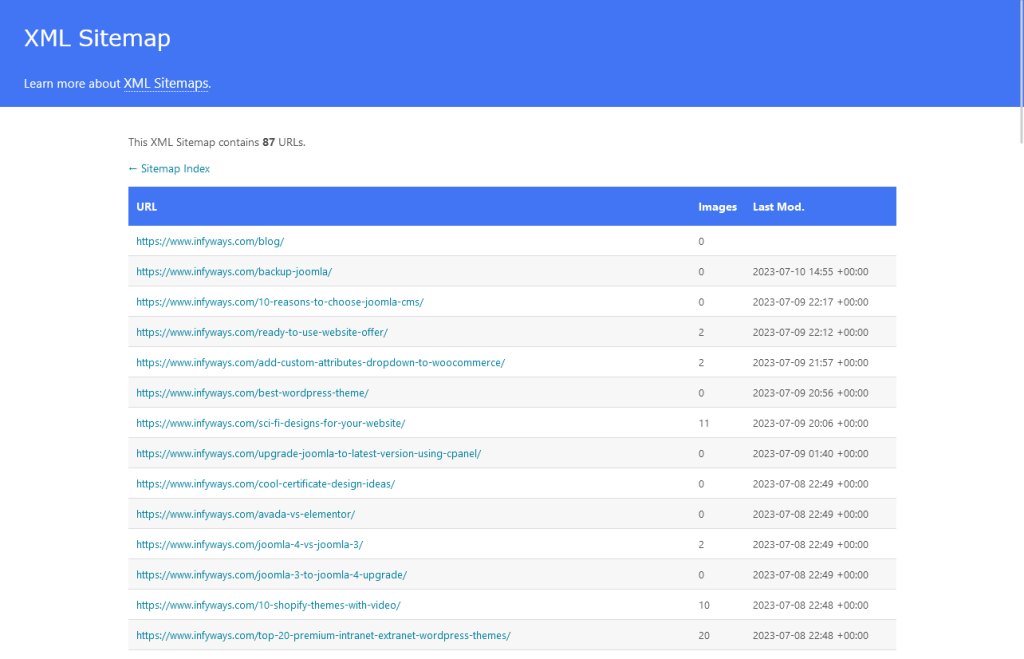
XML sitemaps and robots.txt files are important for search engine crawlers to understand the structure and content of a website.
Joomla allows website owners to generate XML sitemaps and customize their robots.txt files using extensions such as OSMap and Xmap.
Managing duplicate content issues
Duplicate content can negatively impact a website’s search engine ranking.
To manage duplicate content issues, website owners can use canonical tags to indicate the preferred version of a page, use 301 redirects to redirect duplicate content to the preferred version, and avoid using duplicate content on the website.
Implementing structured data and schema markup
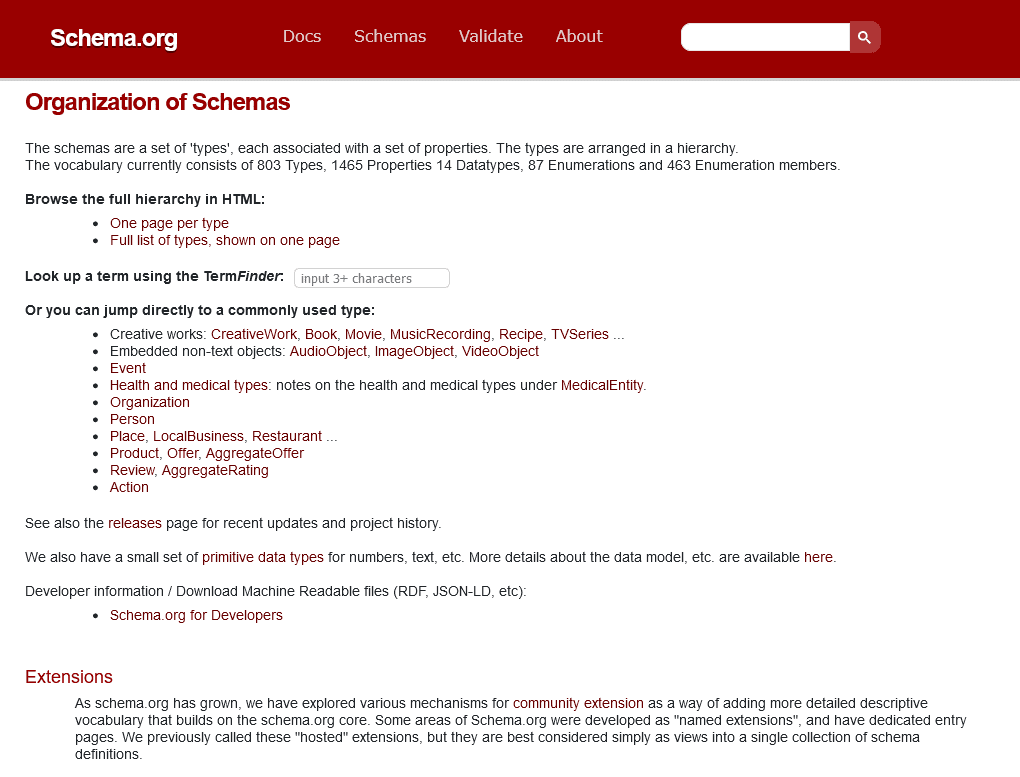
Structured data and schema markup can help search engines understand the content of a website and display rich snippets in search results.
Joomla allows website owners to implement structured data and schema markup using extensions such as Google Structured Data Markup and OSMap. After using the extension you can verify using the google rich snippets tool.
Handling canonical URLs and redirects
Canonical URLs and redirects are important for managing duplicate content and ensuring that search engines understand the preferred version of a page.
Joomla allows website owners to manage canonical URLs and redirects using extensions such as SH404SEF and Redirect Manager.
Technical SEO is an important aspect of Joomla that involves optimizing site speed and performance, implementing XML sitemaps and robots.txt files, managing duplicate content issues, and more.
By following best practices for technical SEO, including handling canonical URLs and redirects, implementing structured data and schema markup, website owners can improve their site’s search engine ranking and visibility.
Joomla Extensions for SEO
Overview of popular SEO extensions for Joomla
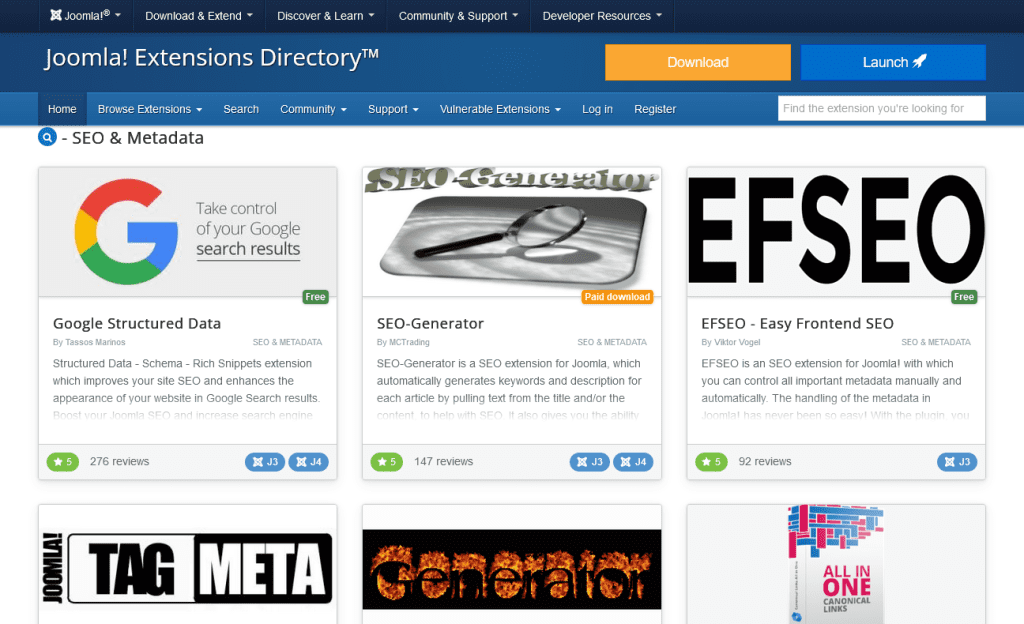
There are various Joomla extensions available including 4SEO by Weeblr, PWT SEO, Google Structured Data, RSSEO!, OSmeta, OSmap, Jsitemap, JCH Optimize, Route66, SEO-Generator, EFSEO – Easy Frontend SEO, ByeByeGenerator, and Tag Meta.
These extensions offer various features such as XML sitemap generation, robots.txt file customization, structured data implementation, and on-page optimization tools.
Analyzing and selecting the right SEO extension for your website
When selecting an SEO extension for a Joomla website, website owners should consider the features and functionality of the extension, as well as its compatibility with their Joomla version and other extensions.
Website owners should also consider the reputation and support of the extension developer, as well as any costs associated with the extension.
Utilizing SEO extensions for on-page optimization
SEO extensions can be used for on-page optimization by providing tools for optimizing page titles, meta descriptions, heading tags, and keyword placement.
Extensions such as SEO-Generator and EFSEO – Easy Frontend SEO can automatically generate page titles and meta descriptions based on the content of the page.
Managing SEO settings and configurations
SEO extensions can also be used for managing SEO settings and configurations, such as enabling search-friendly URLs, managing canonical URLs and redirects, and generating XML sitemaps and robots.txt files.
Extensions such as RSSEO! and OSmap can generate XML sitemaps and customize robots.txt files.
Extensions such as SH404SEF and Redirect Manager can be used for managing canonical URLs and redirects.
Best Practices
Creating high-quality, relevant, and engaging content
Creating high-quality, relevant, and engaging content is a crucial aspect of Joomla SEO.
Website owners should conduct keyword research and incorporate relevant keywords into their content, while also ensuring that the content is engaging and valuable to users.
Content should be well-written, informative, and easy to read, with headings, subheadings, and bullet points to break up the text.
Building a strong internal linking structure
Internal linking is important for improving website navigation and search engine ranking.
Website owners should link to relevant pages within their website using descriptive anchor text.
Internal linking can also help to distribute link equity throughout the website and improve the ranking of important pages.
Leveraging social media for SEO benefits
Social media can be used to improve website visibility and attract more traffic to the website.
Website owners should share their content on social media platforms and engage with their audience to increase brand awareness and drive traffic to the website.
Mobile optimization and responsive design
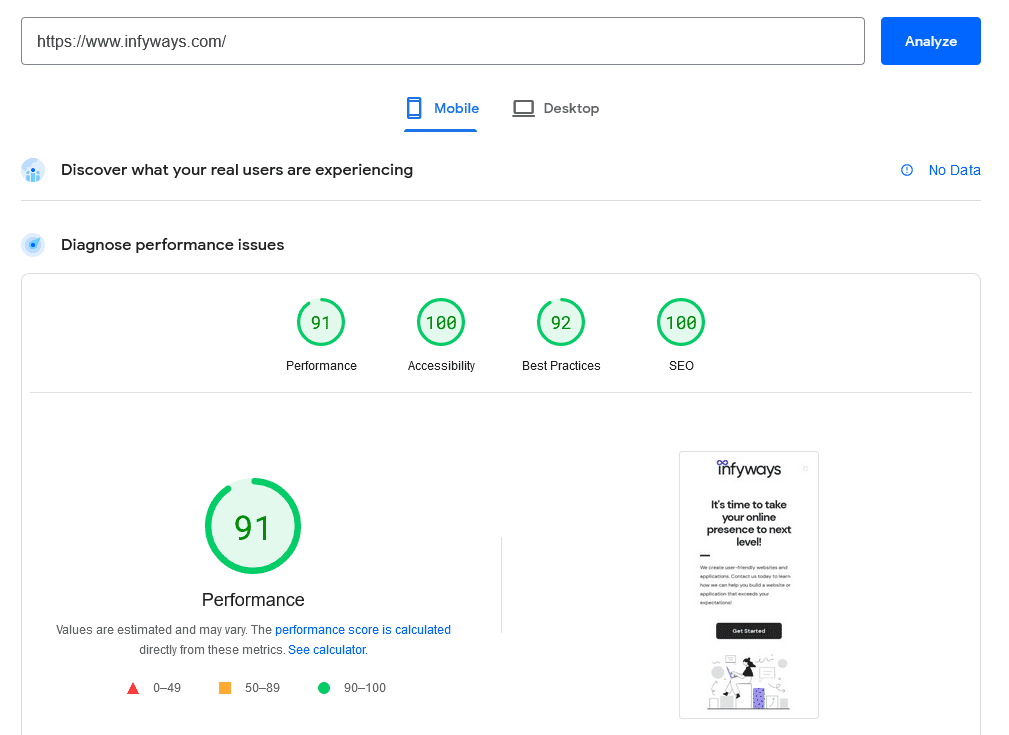
Mobile optimization and responsive design are important for improving user experience and search engine ranking.
Website owners should ensure that their website is mobile-friendly and responsive, with fast loading times and easy navigation on mobile devices. To check core vitals like performance (page speed), accessibility, best practices and SEO you can use the free tool from Google called PageSpeedInsights.
Using the insights you can know if your site is mobile friendly, Search Engine as well as speed optimized. The insights for the desktop can also be viewed in the other tab.
Monitoring and analyzing SEO performance with Joomla tools
Joomla offers various tools for monitoring and analyzing SEO performance, such as Google Analytics integration and SEO-Generator.
Website owners should regularly monitor their website’s SEO performance and make adjustments as needed to improve search engine ranking and visibility.
The best practices include creating high-quality, relevant, and engaging content, building a strong internal linking structure, leveraging social media for SEO benefits, and mobile optimization and responsive design.
By monitoring and analyzing SEO performance with Joomla tools, and following these best practices, website owners can improve their website’s search engine ranking and visibility, attract more organic traffic, and provide a better user experience for their audience.
Summary
- Conduct keyword research and incorporate relevant keywords into content.
- Enable search engine friendly URLs and customize URL structures.
- Use internal linking to improve website navigation and distribute link equity.
- Optimize website for mobile devices and use responsive design.
- Utilize SEO extensions for managing the settings and configurations, implementing structured data, and optimizing on-page elements.
- Create high-quality, relevant, and engaging content.
- Leverage social media for SEO benefits.
- Monitor and analyze SEO performance with Joomla tools.
Implement the strategies for improved SEO performance
- Implementing these Joomla SEO tips and best practices can help website owners improve their website’s search engine ranking, visibility, and user experience.
- By following these strategies, website owners can attract more organic traffic, increase user engagement, and ultimately drive more conversions and revenue.
- It is important to regularly monitor and analyze SEO performance to make adjustments and improvements as needed.
Frequently Asked Questions
How can I optimize Joomla URLs for better SEO?
To optimize Joomla URLs for better SEO, website owners should enable search-friendly URLs and customize their URL structures to include relevant keywords
While it is not necessary to have SEO extensions for Joomla, they can be helpful for managing SEO settings and configurations, implementing structured data, and optimizing on-page elements
What are the common mistakes to avoid?
Common mistakes to avoid in Joomla SEO include keyword stuffing, using duplicate content, neglecting mobile optimization, and ignoring on-page optimization elements such as page titles and meta descriptions
Joomla offers various tools for monitoring and analyzing SEO performance, such as Google Analytics integration and SEO-Generator
Website owners can use these tools to track website traffic, keyword rankings, and other SEO metrics to measure the success of their efforts
What are the latest trends and updates in SEO?
The latest trends and updates include a focus on mobile optimization, the importance of structured data and schema markup, and the use of AI and machine learning in search algorithms.
Website owners should stay up-to-date with the latest trends and updates in SEO to ensure that their website remains optimized for search engines and provides a great user experience for their audience.


